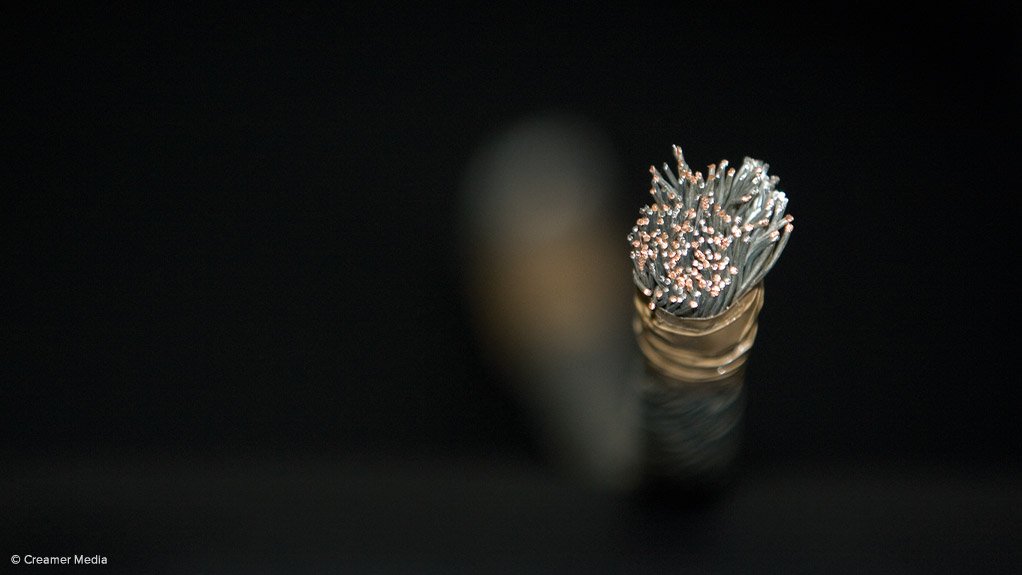Ongoing copper cable theft negatively affects power capacity


COPPER ALLIANCE The high demand for copper and copper alloys, with demand mainly from the Asian region, particularly China, is causing expensive exports to many countries
Ongoing copper cable theft from companies, such as State-owned power utility Eskom, has devastating effects on the local copper industry, says Copper Development Association Africa (CDAA) executive chairperson Evert Swanepoel.
“The country is suffering from inadequate power generation capacity by Eskom because of the rife copper cable theft. The reason for that is because there are thousands of kilometres of underground cable which are unguarded.”
He explains that copper cable thieves dig a trench and cut as much copper cable as they need and attach it to the end of a vehicle, which is then used to pull the cable out. The copper cable, normally covered in plastic, is then taken to scrap merchants, where it is either burned to the point where it can no longer be identified or dumped into a furnace where it is melted.
The cable is burned in a furnace to destroy all identification and is then exported as is or melted into an ingot for export to Asian countries, mainly China.
The high demand in copper and copper alloys results in illegal exports to many countries, with demand mainly from the Asian region particularly China.
The CDAA has combined its efforts with other organisations, such as the Aluminium Federation of South Africa, the Non Ferrous Metal Industries Association of South Africa and the South African Institute of Foundries, to engage various government entities, such as the South African Revenue Service (Sars), the Department of Economic Development and the South African Police Service, regarding the challenges the metals industries are facing.
In its various engagements with Sars, the CDAA has proposed an increase in container inspections at local ports, an abolishment of value-added tax on scrap, the introduction of an export tax and that there be one port for copper export scrap and a ‘no cash for scrap’ rule.
Government is set to announce its revised guidelines in June this year and the CDAA hopes that these rules will be sufficiently stringent to reduce the illegal export of copper alloy scrap.
Article Enquiry
Email Article
Save Article
Feedback
To advertise email advertising@creamermedia.co.za or click here
Press Office
Announcements
What's On
Subscribe to improve your user experience...
Option 1 (equivalent of R125 a month):
Receive a weekly copy of Creamer Media's Engineering News & Mining Weekly magazine
(print copy for those in South Africa and e-magazine for those outside of South Africa)
Receive daily email newsletters
Access to full search results
Access archive of magazine back copies
Access to Projects in Progress
Access to ONE Research Report of your choice in PDF format
Option 2 (equivalent of R375 a month):
All benefits from Option 1
PLUS
Access to Creamer Media's Research Channel Africa for ALL Research Reports, in PDF format, on various industrial and mining sectors
including Electricity; Water; Energy Transition; Hydrogen; Roads, Rail and Ports; Coal; Gold; Platinum; Battery Metals; etc.
Already a subscriber?
Forgotten your password?
Receive weekly copy of Creamer Media's Engineering News & Mining Weekly magazine (print copy for those in South Africa and e-magazine for those outside of South Africa)
➕
Recieve daily email newsletters
➕
Access to full search results
➕
Access archive of magazine back copies
➕
Access to Projects in Progress
➕
Access to ONE Research Report of your choice in PDF format
RESEARCH CHANNEL AFRICA
R4500 (equivalent of R375 a month)
SUBSCRIBEAll benefits from Option 1
➕
Access to Creamer Media's Research Channel Africa for ALL Research Reports on various industrial and mining sectors, in PDF format, including on:
Electricity
➕
Water
➕
Energy Transition
➕
Hydrogen
➕
Roads, Rail and Ports
➕
Coal
➕
Gold
➕
Platinum
➕
Battery Metals
➕
etc.
Receive all benefits from Option 1 or Option 2 delivered to numerous people at your company
➕
Multiple User names and Passwords for simultaneous log-ins
➕
Intranet integration access to all in your organisation


















